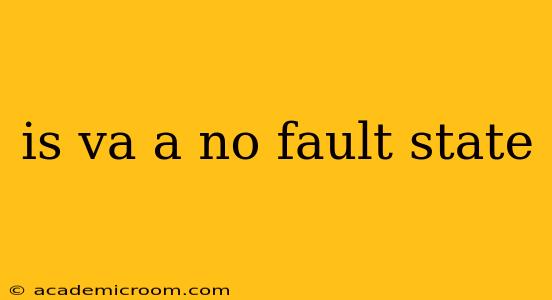Virginia is not a pure no-fault state. This means that, unlike some states, you are not barred from suing the at-fault driver after a car accident, regardless of the severity of your injuries. However, Virginia's system has elements of no-fault insurance, making it somewhat complex. Let's break down the key aspects of Virginia's auto insurance laws.
What Does "No-Fault" Mean in Car Insurance?
In a true no-fault system, drivers involved in an accident file claims with their own insurance companies, regardless of who caused the accident. They receive compensation for medical bills and lost wages from their own policies, limiting lawsuits against the other driver. This is designed to reduce the number of lawsuits and lower insurance premiums.
How Does Virginia's System Differ from a Pure No-Fault System?
Virginia is a modified no-fault state. This means you can pursue a lawsuit against the at-fault driver if your medical expenses exceed a certain threshold, or if you've suffered specific types of injuries. This threshold is crucial to understanding your rights after a car accident in Virginia.
What is the Threshold for Suing in Virginia After a Car Accident?
In Virginia, you generally can sue the at-fault driver if your medical bills exceed $3,000 or you suffer what's considered a "serious injury." This might include:
- Significant and permanent loss of bodily function: This requires substantial impairment of your ability to perform daily activities.
- Permanent injury: This signifies a lasting physical impairment.
- Significant and permanent scarring or disfigurement: This pertains to visible and lasting physical damage.
- Death: Obviously, death resulting from a car accident automatically opens the door to a lawsuit.
It's important to note that determining whether an injury meets the threshold for a lawsuit can be complex and often involves medical professionals and legal experts.
What if My Medical Bills Are Below $3,000?
If your medical expenses are below $3,000 and you don't meet the criteria for a "serious injury," you're generally limited to recovering damages through your own insurance policy's Personal Injury Protection (PIP) coverage. This coverage usually pays for medical expenses and lost wages, regardless of fault. However, the amount you can recover under PIP is limited.
Do I Need an Attorney After a Car Accident in Virginia?
Navigating Virginia's auto insurance laws can be difficult. While you're not automatically barred from suing, understanding the thresholds and requirements for pursuing a claim can be challenging. Consulting with a personal injury attorney experienced in Virginia law is highly recommended to understand your rights and options after a car accident. They can help you determine if your injuries meet the threshold for a lawsuit and guide you through the process.
What Kind of Coverage Do I Need in Virginia?
Virginia requires minimum liability coverage, but many drivers find additional coverage beneficial:
- Liability Coverage: This covers damages you cause to others in an accident.
- Uninsured/Underinsured Motorist Coverage: This protects you if you're hit by an uninsured or underinsured driver.
- Personal Injury Protection (PIP): This covers your medical expenses and lost wages, regardless of fault.
- Collision Coverage: This covers damage to your vehicle in an accident, regardless of fault.
- Comprehensive Coverage: This covers damage to your vehicle from events other than collisions, such as theft or hail.
This information is for general guidance only and does not constitute legal advice. You should always consult with a qualified legal professional for advice tailored to your specific situation.
